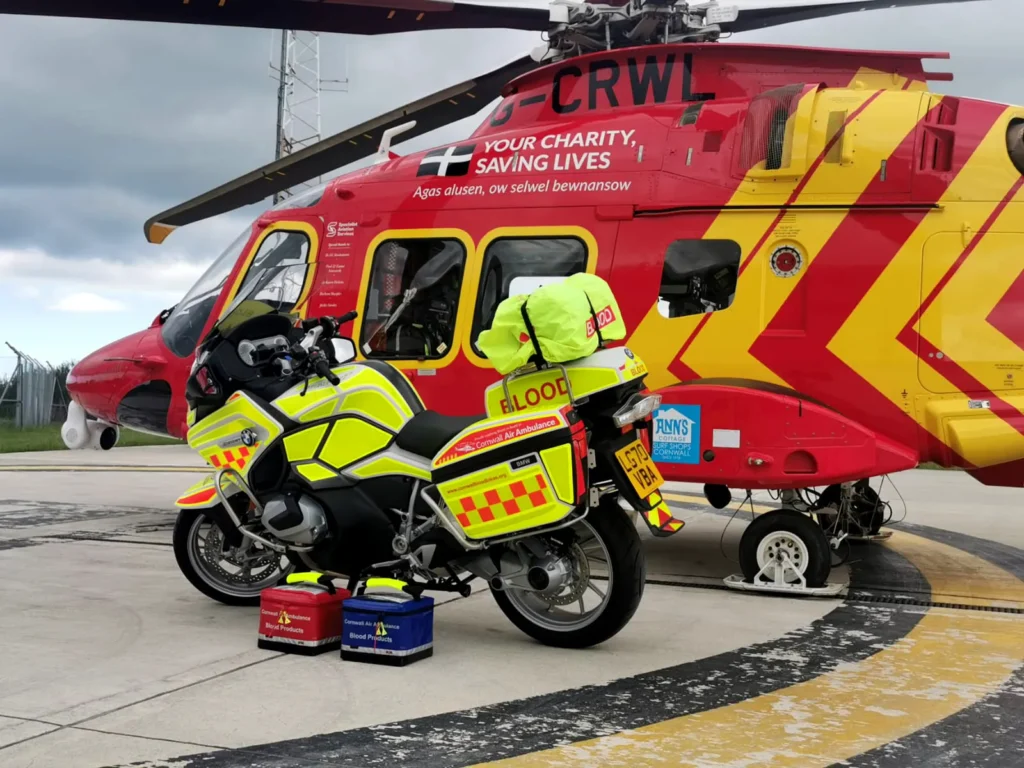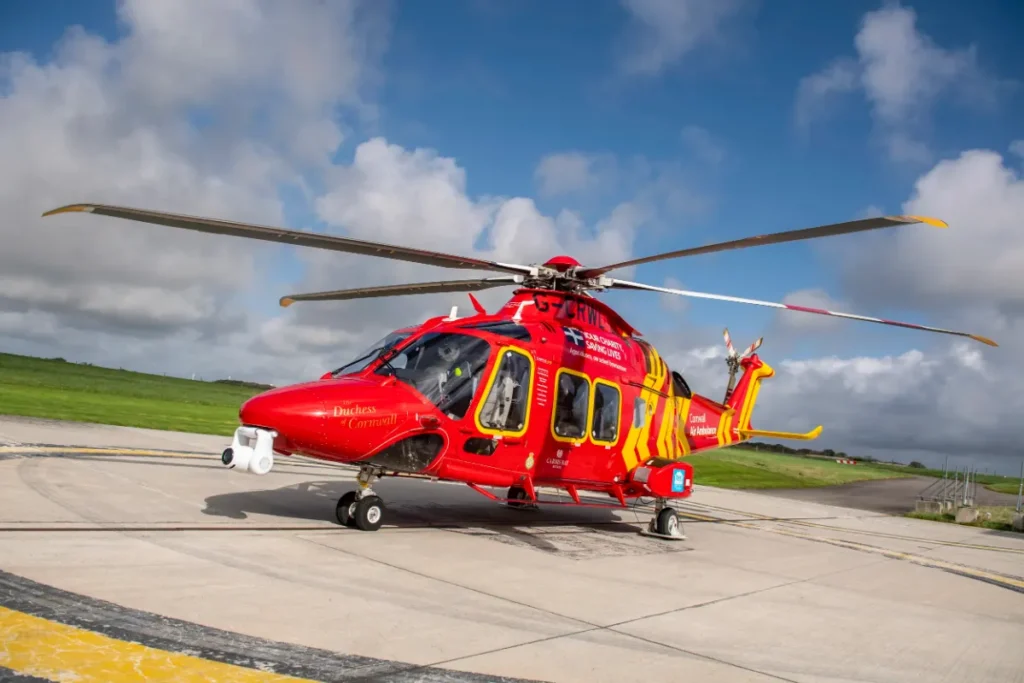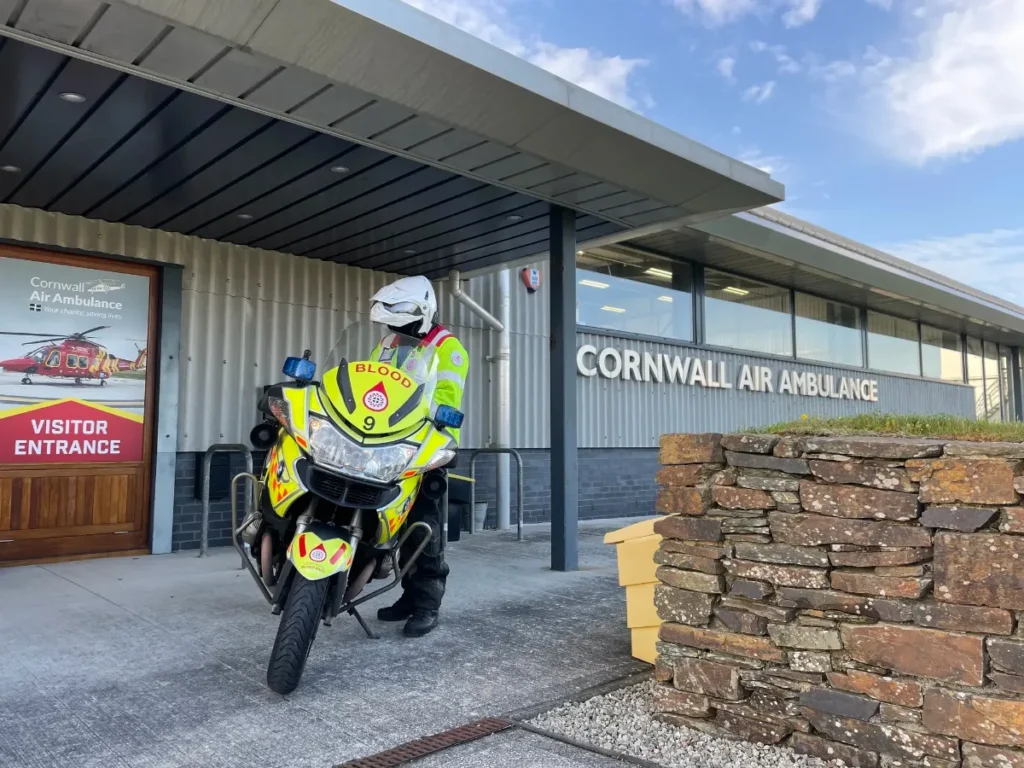Celebrating the Incredible Work of Cornwall Blood Bikes

SEARCH BLOG POSTS
SEARCH BY CATEGORIES
SEARCH BY MONTH
Throughout Cornwall, a group of unsung heroes are primed and ready to rev up their motorcycle engines for a vital cause that saves lives. Cornwall Blood Bikes riders tirelessly navigate the winding roads of our picturesque county to deliver urgent medical supplies, supporting our NHS out of hours when patients need it most.
Whether it’s blood, plasma, or vital medications, the dedicated team of volunteer motorcyclists ensure that critical deliveries reach hospitals and patients in need, often racing against the clock. Their unwavering commitment and remarkable service have become a lifeline for many, embodying the true spirit of community and selfless dedication.
Join us in celebrating the incredible work of Cornwall Blood Bikes, where every journey they undertake is a testament to the power of compassion and the impact of collective effort.
National Blood Bikes Day
Blood Bike Day is Friday 9th August 2024 and marking the incredible work the self-funding volunteers do has never been more important.
All blood bike riders are unpaid volunteers who use their fleet of charity owned BMW motorcycles and fuel to provide this service to the NHS free of charge. Like CAAT, Cornwall Blood Bikes doesn’t receive any funding from the NHS or government, so acknowledging National Blood Bikes Day is crucial to honour the incredible work of volunteers who contribute selflessly to provide this vital service. Without fundraising and encouraging others to recognise the work they do, the riders could not put fuel in their fleet bikes, maintain them, insure them or continue their free service for the NHS to call.
Who Are Cornwall Blood Bikes?
Blood Bikes Cornwall is a 100% volunteer-run charity that provides a completely free out-of-hours delivery service for items that cannot wait to the NHS. The riders deliver blood samples, plasma, stem cells, donated human milk, medication, documents and other items all over Cornwall.
Cornwall Blood Bikes is a member of the Nationwide Association of Blood Bikes (NABB) whose membership of blood bike groups is countrywide and encompasses hundreds of motorcyclists who freely volunteer their time to the service.
The concept was founded by Margaret Ryerson and her husband in London in the early 1960s who formed Surrey’s Emergency Volunteer Service – putting riders’ love of motorcycling to practical use by supporting hospitals. Today, more than 100,000 responses are collectively delivered yearly, free of charge, to the NHS & HSE, by unpaid volunteers.

What Do They Do?
Cornwall Blood Bikes operate out of hours (Monday to Friday 5pm-7am, 24 hours weekends and bank holidays). They operate when the NHS courier has stopped working for the day, therefore the NHS would have to rely on taxis to get these urgent items moved with a significant cost to the NHS.
It is a registered charity consisting of a group of self-funding volunteers who provide a free ‘out of hours’ delivery service to NHS partners throughout Cornwall and beyond.
How Do Cornwall Blood Bikes Support the Community?
Along with their life-saving work, Cornwall Blood Bike volunteers also engage in community outreach and educational activities to help raise awareness about the work of volunteers and the work they complete and the mileage covered. They also promote good road safety and help to raise the public profile of motorcycle riders across the county and to always promote a positive image of motorcycling.
How Do They Support Cornwall Air Ambulance?
Here at Cornwall Air Ambulance we have a close partnership with Cornwall Blood Bikes. The crew has been carrying blood products on board your helicopter since December 2020, having blood on board gives us the option to start transfusions before a patient even reaches hospital. The blood is transported daily from the Royal Cornwall Hospital to the Cornwall Air Ambulance airbase in Newquay, 365 days a year and whatever the weather, thanks to the volunteer riders from Cornwall Blood Bikes.

How Are Cornwall Blood Bikes Funded?
Cornwall Blood Bikes are entirely self-funded and rely purely on donations to be able to continue their work. The riders use the charity’s own BMW motorcycles, generously giving up their time to race urgent medical items to hospitals and healthcare providers who need these provisions to save critically ill patients.
How You Can Support National Blood Bikes Day
Supporting National Blood Bikes Day is a fantastic way to make a real impact and be part of a community-driven effort to save lives. It costs a lot to keep the Cornwall blood bikes on the road… the average monthly running cost per motorcycle is £500. This includes fuel, insurance, servicing, health checks, tracker systems, cameras, tyres etc and ensures the bikes and riders are as safe as possible. With 19 bikes, this means that the total cost each month amounts to £9,500 just to keep the fleet wheels turning.
On National Blood Bikes Day, why not consider making a financial contribution to help keep the bikes on the road? If you are unable to give a monetary donation, there are lots of other ways to support this charity on National Blood Bikes Day:
- Share the mission of the Blood Bikes on social media. Use hashtags like #NationalBloodBikesDay #BloodBikeDay #ridingforlife and #RideToSaveLives to raise awareness. You can post stories, and pictures, and even create a short video explaining why Blood Bikes are crucial.
- If you’re a motorcycle enthusiast, why not join the team? Blood Bikes organisations are often looking for volunteer riders and coordinators. It’s a unique way to combine your passion for riding with a commitment to helping others.
- Organise a local event such as a bike ride, cake bake sale, fun dog show or charity auction. This not only raises funds but also brings the community together in support of a common cause. Get creative and have fun with it!
- Many Blood Bikes organisations host events to celebrate National Blood Bikes Day. Check out what’s happening near you and join in. It’s a great opportunity to meet the volunteers, learn more about their work, and show your support.

Real-Life Stories
Last year, the crew carried out 14 potentially lifesaving blood transfusions. Without having vital blood to carry out these procedures at the roadside and in the Air Ambulance, these fortunate patients wouldn’t be here today.
Dr Ian Sullivan, blood transfusion manager for the RCHT, said: “Blood loss is a major factor in the survival of trauma patients, and having blood available at the scene of an incident undoubtedly saves more lives”
Zack Hancock
Within just three days of the blood bike service launching in 2021, 17-year-old Zack Hancock received an emergency transfusion on the roadside following a serious road traffic collision at St Tudy, which left him with life-threatening injuries. He was airlifted to Derriford Hospital and spent 11 days in a coma. Despite internal injuries and broken bones in his face, arms and legs, Zack made a full recovery thanks to the speedy blood transfusion he received at the scene.
Bayley Skewes
Bayley, from Helston, was on his normal commute on 25th September 2022 when he misjudged a corner and hit a tree. He came off his motorbike and ended up in a ditch.
Initially, Bayley thought he had just winded himself and possibly broken his leg. Conscious and able to reach his phone, he called his mum to let her know what had happened. It transpired that Bayley had suffered a stage four liver laceration, bleeding in the lungs and had broken his femur in two.
Cornwall Air Ambulance arrived on the scene and performed a roadside blood transfusion before they could airlift him to hospital. He was in hospital for three weeks but made a good recovery thanks to the work of Cornwall Blood Bikes and CAAT.

In Partnership with Cornwall Air Ambulance
Cornwall Air Ambulance is proud to be supporting National Blood Bikes Awareness Day and celebrating our close partnership work with Cornwall Blood Bikes. Your support will make such a difference to the lifesaving work we do in partnership with Cornwall Blood Bikes. We receive no government funding to run our services and rely so greatly on generous people like you. Find out more about how you can get involved and support our work here:
Frequently Asked Questions
1. What do blood bikes deliver?
Cornwall Blood Bikes deliver a variety of essential medical items, including blood, plasma, stem cells, donor breast milk, platelets, biological samples, medication, controlled drugs, medical notes, and occasionally small medical equipment. These deliveries are critical for the timely treatment of patients across hospitals and medical facilities.
2. Do blood bike riders get paid?
No, blood bike riders do not get paid. Cornwall Blood Bikes is a volunteer-based organisation. The riders are dedicated volunteers who generously give their time and skills to support the healthcare system without any financial compensation. They also have a team of coordinators who are vital to the charity, these individuals are the first point of contact with the NHS, they dispatch the riders, maintain audit trails, and record information. They can have up to nine riders out at any time all over Cornwall and beyond. It is a very challenging role and without these individuals the bikes wouldn’t go anywhere.
3. Do blood bikes transport organs?
Typically, Cornwall Blood Bikes do not transport organs. Organ transportation usually requires specialised handling and is often managed by dedicated organ transplant services. However, blood bikes can transport other time-sensitive and vital medical materials.
4. How can someone become a volunteer rider for Cornwall Blood Bikes?
To become a volunteer rider for Cornwall Blood Bikes, you must have a full motorcycle license and undergo an advanced rider training and up to date assessment. Prospective volunteers should also complete the necessary training provided by the organisation. Interested individuals can apply through the Cornwall Blood Bikes website or contact the organisation directly for more details.